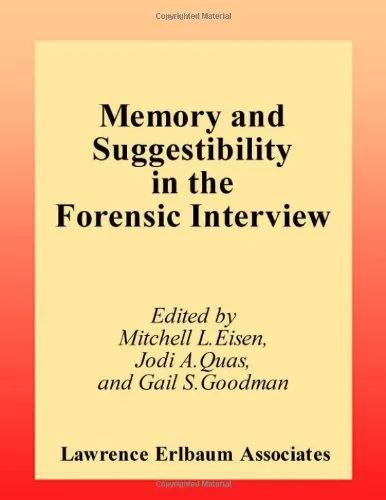Memory and Suggestibility in the Forensic interview (Personality and Clinical Psychology Series)
4.5
Reviews from our users

You Can Ask your questions from this book's AI after Login
Each download or ask from book AI costs 2 points. To earn more free points, please visit the Points Guide Page and complete some valuable actions.Introduction to "Memory and Suggestibility in the Forensic Interview"
"Memory and Suggestibility in the Forensic Interview" is a groundbreaking book in the field of forensic psychology, written by distinguished researchers Mitchell L. Eisen, Jodi A. Quas, and Gail S. Goodman. This volume offers deep insights into the complex interplay between memory, suggestibility, and how they influence forensic interviews. It is part of the esteemed Personality and Clinical Psychology Series and is designed for professionals, researchers, and students seeking evidence-based strategies for improved interviewing techniques.
In legal and judicial settings, the reliability of eyewitness testimony, especially from vulnerable populations like children, is crucial. However, issues such as memory distortions, suggestive questioning, and external influences can compromise the integrity of this testimony. This book delves into the psychological mechanisms that influence memory and suggestibility, offering practical guidelines to mitigate these challenges. By weaving theoretical foundations, empirical research findings, and real-life case studies, the authors provide a comprehensive resource that bridges science and application in forensic contexts.
Detailed Summary
At its core, the book investigates how memory works under various conditions and the implications for forensic interviews. The authors address critical topics, such as memory accuracy, the effects of stress and trauma, factors that influence suggestibility, and the challenges of interviewing children or individuals with cognitive impairments. The book showcases how forensic interviews can either enhance or compromise the quality of testimony through the use of suggestive questioning, leading to either accurate recall or false memories.
Divided into several thematic sections, "Memory and Suggestibility in the Forensic Interview" explores the neuroscience and psychology of memory formation, the factors that impact memory retrieval, and strategies to minimize external influences during interviews. The authors also focus on the legal and ethical considerations of forensic investigations, offering guidelines for conducting interviews while upholding the integrity and welfare of the interviewees.
With a rich blend of academic rigor and practical applications, the book offers empirical evidence to help forensic practitioners make informed decisions. It is indispensable reading for anyone involved in legal proceedings that rely on testimonial evidence, including psychologists, law enforcement officials, attorneys, and judges.
Key Takeaways
- Understanding how memory functions under stress and trauma, and its impact on forensic testimony.
- Techniques to minimize suggestibility during interviews, ensuring accurate and reliable information retrieval.
- Critical analysis of the psychological dynamics affecting vulnerable populations such as children and cognitively impaired individuals.
- Legal and ethical guidelines for conducting interviews that respect the dignity of the interviewees.
- A detailed exploration of false memories and how to prevent their influence on judicial outcomes.
Famous Quotes from the Book
"The interview process is not neutral; it has the power to either illuminate the truth or distort it beyond recognition."
"Memory is malleable, and suggestive techniques in interviews can transform truth into fiction. The challenge lies in safeguarding authenticity."
Why This Book Matters
This book is a vital resource for anyone involved in the intersection of psychology, law, and human rights. The accuracy and reliability of forensic interviews often determine the outcomes of critical legal cases. Missteps in interviewing techniques can lead to false accusations, wrongful convictions, or the dismissal of genuine victims' accounts. Therefore, this book addresses a pressing need in contemporary forensic practices.
By highlighting the science behind memory and suggestibility, the authors empower readers to critically evaluate and refine their approaches to obtaining testimonial evidence. Furthermore, the book's focus on ethics and humanity ensures that interview processes serve justice while protecting the emotional and psychological well-being of participants. It elevates the standard of forensic interviews, making it invaluable for legal professionals, academic researchers, and policymakers alike.
Free Direct Download
You Can Download this book after Login
Accessing books through legal platforms and public libraries not only supports the rights of authors and publishers but also contributes to the sustainability of reading culture. Before downloading, please take a moment to consider these options.
Find this book on other platforms:
WorldCat helps you find books in libraries worldwide.
See ratings, reviews, and discussions on Goodreads.
Find and buy rare or used books on AbeBooks.
1085
بازدید4.5
امتیاز50
نظر98%
رضایتReviews:
4.5
Based on 0 users review
"کیفیت چاپ عالی بود، خیلی راضیام"


